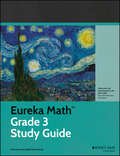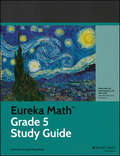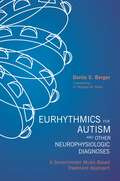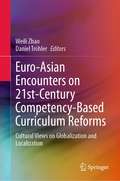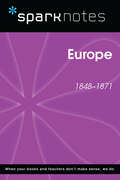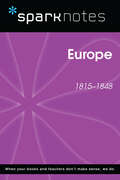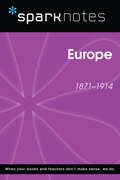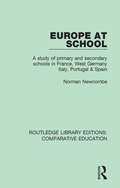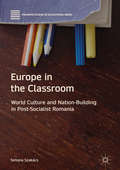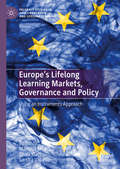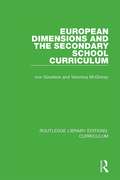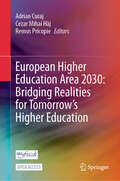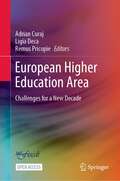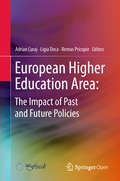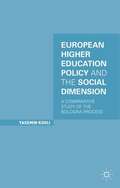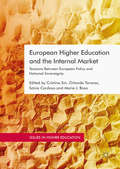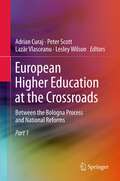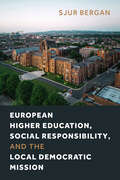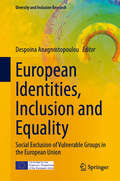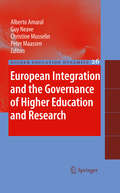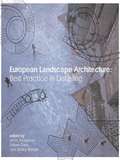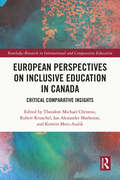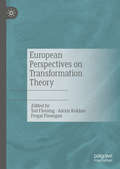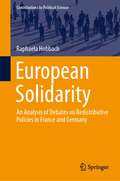- Table View
- List View
Eureka Math Study Guide: A Story of Units, Grade 3 (Common Core Mathematics)
by Great MindsEureka Math is a comprehensive, content-rich PreK–12 curriculum that follows the focus and coherence of the Common Core State Standards in Mathematics (CCSSM) and carefully sequences the mathematical progressions into expertly crafted instructional modules. The companion Study Guides to Eureka Math gather the key components of the curriculum for each grade into a single location, unpacking the standards in detail so that both users and non-users of Eureka Math can benefit equally from the content presented. <P><P> Each of the Eureka Math Curriculum Study Guides includes narratives that provide educators with an overview of what students should be learning throughout the year, information on alignment to the instructional shifts and the standards, design of curricular components, approaches to differentiated instruction, and descriptions of mathematical models. The Study Guides can serve as either a self-study professional development resource or as the basis for a deep group study of the standards for a particular grade. For teachers who are new to the classroom or the standards, the Study Guides introduce them not only to Eureka Math but also to the content of the grade level in a way they will find manageable and useful. Teachers familiar with the Eureka Math curriculum will also find this resource valuable as it allows for a meaningful study of the grade level content in a way that highlights the coherence between modules and topics. The Study Guides allow teachers to obtain a firm grasp on what it is that students should master during the year.<P> The Eureka Math Curriculum Study Guide, Grade 3 provides an overview of all of the Grade 3 modules, including Properties of Multiplication and Division and Solving Problems with Units of 2–5 and 10; Place Value and Problem Solving with Units of Measure; Multiplication and Division with Units of 0, 1, 6–9, and Multiples of 10; Multiplication and Area; Fractions as Numbers on the Number Line; and Collecting and Displaying Data.
Eureka Math Study Guide: A Story of Units, Grade 5 (Common Core Mathematics)
by Great MindsEureka Math is a comprehensive, content-rich PreK–12 curriculum that follows the focus and coherence of the Common Core State Standards in Mathematics (CCSSM) and carefully sequences the mathematical progressions into expertly crafted instructional modules. The companion Study Guides to Eureka Math gather the key components of the curriculum for each grade into a single location, unpacking the standards in detail so that both users and non-users of Eureka Math can benefit equally from the content presented. <P><P> Each of the Eureka Math Curriculum Study Guides includes narratives that provide educators with an overview of what students should be learning throughout the year, information on alignment to the instructional shifts and the standards, design of curricular components, approaches to differentiated instruction, and descriptions of mathematical models. The Study Guides can serve as either a self-study professional development resource or as the basis for a deep group study of the standards for a particular grade. For teachers who are new to the classroom or the standards, the Study Guides introduce them not only to Eureka Math but also to the content of the grade level in a way they will find manageable and useful. Teachers familiar with the Eureka Math curriculum will also find this resource valuable as it allows for a meaningful study of the grade level content in a way that highlights the coherence between modules and topics. The Study Guides allow teachers to obtain a firm grasp on what it is that students should master during the year.<P> The Eureka Math Curriculum Study Guide, Grade 5 provides an overview of all of the Grade 5 modules, including Place Value and Decimal Fractions; Multi-Digit Whole Number and Decimal Fraction Operations; Addition and Subtraction of Fractions; Multiplication and Division of Fractions and Decimal Fractions; Addition and Multiplication with Volume and Areal; Problem Solving with the Coordinate Plane.
Eurhythmics for Autism and Other Neurophysiologic Diagnoses: A Sensorimotor Music-Based Treatment Approach
by Stephen M. Shore Dorita S. BergerIn Eurhythmics for Autism and Other Neurophysiologic Diagnoses, Dorita S. Berger reveals how Eurhythmics, a method of teaching the musical concepts of rhythm, structure and expression kinaesthetically through movement, can help develop sensorimotor skills in children and adults with autism and other special needs. Covering both theory and practice, she explains this innovative, music-based approach and how it can also address cognitive and sensory issues in adults with debilitating conditions, such as dementia or post-traumatic stress disorder. With a particular emphasis on autism, she provides clear and adaptable session plans, suitable for working with children and adults of all ages.
Euro-Asian Encounters on 21st-Century Competency-Based Curriculum Reforms: Cultural Views on Globalization and Localization
by Daniel Tröhler Weili ZhaoThis book offers a geographically unique cultural comparative lens to examine the issue of transnational curriculum knowledge (re)production. Prompted by the ongoing competency-based curriculum reforms on a global scale, this book examines where global frameworks like the OECD’s core competency definitions are rooted and how they are borrowed, resisted, and/or re-contextualized in various European states with a Christian, foremost Protestant educational–cultural heritage and Asian countries with a Confucian educational–cultural heritage. It highlights the roles that various factors, such as history, culture, religious attitudes, ideology, and state governance play in nation-states’ re-contextualization of global curriculum policies and practices beyond a simplistic and dualistic globalism/power and nationalism/resistance dynamic. In doing so, it provides a global context to better understand individual nation-state’s continuing curriculum reforms and school practices. At the same time, it situates individual nation-state’s latest curriculum reforms and practices within an international community for healthy dialogues and mutual sharing. By selecting two educational–cultural systems and wisdom—Christian-Protestant and Confucian—it also offers a springboard for international curriculum studies beyond the usual confinement of geopolitical nation-state constructs. It not only sheds new light on each nation-state’s curriculum policies and practices, but also creates new collaboration spaces within similar and across disparate cultural–educational regions. With its wide geopolitical and educational–cultural scope, this book appeals to a global market and can be used in a variety of undergraduate and graduate courses in comparative education, history of education, curriculum theory, school and society, and curriculum history.
Europe (SparkNotes History Notes)
by SparkNotesEurope (1848-1871) (SparkNotes History Note) Making the reading experience fun! SparkNotes History Guides help students strengthen their grasp of history by focusing on individual eras or episodes in U.S. or world history. Breaking history up into digestible lessons, the History Guides make it easier for students to see how events, figures, movements, and trends interrelate. SparkNotes History Guides are perfect for high school and college history classes, for students studying for History AP Test or SAT Subject Tests, and simply as general reference tools.Each note contains a general overview of historical context, a concise summary of events, lists of key people and terms, in-depth summary and analysis with timelines, study questions and suggested essay topics, and a 50-question review quiz.
Europe (SparkNotes History Notes)
by SparkNotesEurope (1815-1848) (SparkNotes History Note) Making the reading experience fun! SparkNotes History Guides help students strengthen their grasp of history by focusing on individual eras or episodes in U.S. or world history. Breaking history up into digestible lessons, the History Guides make it easier for students to see how events, figures, movements, and trends interrelate. SparkNotes History Guides are perfect for high school and college history classes, for students studying for History AP Test or SAT Subject Tests, and simply as general reference tools.Each note contains a general overview of historical context, a concise summary of events, lists of key people and terms, in-depth summary and analysis with timelines, study questions and suggested essay topics, and a 50-question review quiz.
Europe (SparkNotes History Notes)
by SparkNotesEurope (1871-1914) (SparkNotes History Note) Making the reading experience fun! SparkNotes History Guides help students strengthen their grasp of history by focusing on individual eras or episodes in U.S. or world history. Breaking history up into digestible lessons, the History Guides make it easier for students to see how events, figures, movements, and trends interrelate. SparkNotes History Guides are perfect for high school and college history classes, for students studying for History AP Test or SAT Subject Tests, and simply as general reference tools.Each note contains a general overview of historical context, a concise summary of events, lists of key people and terms, in-depth summary and analysis with timelines, study questions and suggested essay topics, and a 50-question review quiz.
Europe at School: A Study of Primary and Secondary Schools in France, West Germany, Italy, Portugal & Spain (Routledge Library Editions: Comparative Education #12)
by Norman NewcombeOriginally published in 1977. This is a lively account of the day-to-day running of European schools based in five countries - France, West Germany, Italy, Spain and Portugal. It outlines the organisation of education in these countries, and examines aspects of curriculum, teaching methods, examinations, attitudes of teachers and pupils, buildings, equipment, out-of-school activities, pastoral care, discipline and rules and depicts what it is like to be a pupil or teacher in a European school. The schools discussed are mainly primary and lower secondary grades - the basic compulsory education of each country. Details of working hours, programmes and curricula which are, notably, often government controlled, are given in Appendices. But the author stresses that his aim throughout has been to show how individual schools work and adopt these rules to their own situation. He discusses the relative advantages and drawbacks of different educational systems, and draws his own conclusions about the favourable impressions he gained from many schools and the Awful Warning he saw in a few. This survey throws as much light on schools at home as on those in Europe and suggests that we have a good deal to learn from our neighbours.
Europe in the Classroom: World Culture and Nation-Building in Post-Socialist Romania (Palgrave Studies in Educational Media)
by Simona SzakácsThis book provides an unconventional account of post-1989 education reform in Romania. By drawing on policy documentation, interviews with key players, qualitative data from everyday school contexts, and extensive textbook analysis, this groundbreaking study explores change within the Romanian education system as a process that institutionalises world culture through symbolic mediation of the concept ‘Europe’. The book argues that the education system’s structural and organisational evolution through time is decoupled from its self-depiction by ultimately serving a nation-building agenda. It does so despite notable changes in the discourse reflecting increasingly transnational definitions of the mission of the school in the post-1989 era. The book also suggests that the notions of ‘nation’ and ‘citizen’ institutionalised by the school are gradually being redefined as cosmopolitan, matching post-war patterns of post-national affiliations on a worldwide level.
Europe's Lifelong Learning Markets, Governance and Policy: Using an Instruments Approach (Palgrave Studies in Adult Education and Lifelong Learning)
by Marcella Milana Gosia Klatt Sandra VatrellaThis book explores European governance and policy coordination within lifelong learning markets. Using an instruments approach, the editors and contributors examine the ways in which governance mechanisms employed by the European Union influence policy to regulate lifelong learning, and intervene in lifelong learning markets, at both European and national levels. Filling an important gap in the current literature, this book examines how strengthened policy coordination at the EU level contributed to the blurring of boundaries between policy fields and the redefinition of the function of adult education after the 2008 recession. Divided into three parts, this book draws on a range of case studies from countries including Spain, Denmark, Bulgaria and the UK. It will be of interest and value to students and scholars of education policy and governance, adult education and lifelong learning.
European Dimensions and the Secondary School Curriculum (Routledge Library Editions: Curriculum #9)
by Ivor Goodson Veronica McGivneyOriginally published in 1985. ‘Europe‘ and the EEC seemed to be virtually synonymous for the majority of our population and the ambivalent feelings many people have about the Community, together with the consistently bad press it received in the UK, seemed to engender a hostility in educational circles towards teaching about Europe as a whole. However, if one of the aims of education is to increase children’s awareness, tolerance and understanding of the world about them; to widen their experience and horizons; then teaching about the wider world must have a place in the curriculum. This book argues for education about Europe, not necessarily in favour of Europe, breaking down the national insularity of the UK curriculum and using Europe as one convenient ‘window on the wider world’.
European Higher Education Area 2030: Bridging Realities for Tomorrow’s Higher Education
by Adrian Curaj Remus Pricopie Cezar Mihai HâjThis open access book presents the major outcomes of the fifth edition of the Future of Higher Education – Bologna Process Researchers’ Conference (FOHE-BPRC5), organized by the Executive Agency for Higher Education, Research, Development and Innovation Funding (UEFISCDI) prior to the 2024 Ministerial Conference in Tirana. The Conference is considered a landmark in the European Higher Education Area, encouraging dialogue between researchers and policy-makers. The resulting book provides a forward-looking perspective on how the EHEA is evolving in response to current challenges and opportunities, by focusing on topics such as internationalization, equity and employability, fundamental values, impact of digitalization or innovative learning and teaching. The papers presented offer insights in these areas, illustrating successful or failed implementations within the EHEA and are published in open access format to ensure that the researchers’ perspectives are widely available to European policy and decision makers. Since 2024 marks the first post pandemic edition of the Conference, it is a good moment to not only to take stock of the challenges brought by the Covid-19 pandemic and the war in Ukraine, but also to explore how scientific research can support policy into shaping the directions for the future to come.
European Higher Education Area: Challenges For A New Decade
by Adrian Curaj Ligia Deca Remus PricopieThis open access book presents the major outcomes of the fourth edition of the Future of Higher Education – Bologna Process Researchers Conference (FOHE-BPRC 4) which was held in January 2020 and which has already established itself as a landmark in the European higher education environment. The conference is part of the official calendar of the European Higher Education Area (EHEA) for events that promote and sustain the development of EHEA. The conference provides a unique forum for dialogue between researchers, experts and policy makers in the field of higher education, all of which is documented in this proceedings volume. The book focuses on the following five sub-themes: - Furthering the Internationalization of Higher Education: Particular - Challenges in the EHEA - Access and Success for Every Learner in Higher Education - Advancing Learning and Teaching in the EHEA: Innovation and Links With Research - The Future of the EHEA - Principles, Challenges and Ways Forward - Bologna Process in the Global Higher Education Arena. Going Digital? While acknowledging the efforts and achievements so far at EHEA level, the Paris Ministerial Communiqué highlights the need to intensify crossdisciplinary and cross-border cooperation. One of the ways to achieve this objective is to develop more efficient peer-learning activities, involving policymakers and other stakeholders from as many member states as possible for which this book provides a platform. It acknowledges the importance of a continued dialogue between researchers and decisionmakers and benefits from the experience already acquired, this way enabling the higher education community to bring its input into the 2020. European Higher Education Area (EHEA) priorities for 2020 onwards. European Higher Education Area: Challenges for a New Decade marks 21 years of Bologna Process and 10 years of EHEA and brings together an unique collection of contributions that not only reflect on all that has been achieved in these years, but more importantly, shape directions for the future. This book is published under an open access CC BY license.
European Higher Education Area: The Impact of Past and Future Policies
by Adrian Curaj Ligia Deca Remus PricopieThis volume presents the major outcomes of the third edition of the Future of Higher Education – Bologna Process Researchers Conference (FOHE-BPRC 3) which was held on 27-29 November 2017. It acknowledges the importance of a continued dialogue between researchers and decision-makers and benefits from the experience already acquired, this way enabling the higher education community to bring its input into the 2018-2020 European Higher Education Area (EHEA) priorities. The Future of Higher Education – Bologna Process Researchers Conference (FOHE-BPRC) has already established itself as a landmark in the European higher education environment. The two previous editions (17-19 October 2011, 24-26 November 2014), with approximately 200 European and international participants each, covering more than 50 countries each, were organized prior to the Ministerial Conferences, thus encouraging a consistent dialogue between researchers and policy makers. The main conclusions of the FOHE Conferences were presented at the EHEA Ministerial Conferences (2012 and 2015), in order to make the voice of researchers better heard by European policy and decision makers. This volume is dedicated to continuing the collection of evidence and research-based policymaking and further narrowing the gap between policy and research within the EHEA and broader global contexts. It aims to identify the research areas that require more attention prior to the anniversary 2020 EHEA Ministerial Conference, with an emphasis on the new issues on rise in the academic and educational community. This book gives a platform for discussion on key issues between researchers, various direct higher education actors, decision-makers, and the wider public. This book is published under an open access CC BY license.
European Higher Education Policy and the Social Dimension
by Yasemin KooijThe Bologna Process has significantly shaped recent higher education policies across Europe, but the area of the social dimension has so far been neglected. Drawing on a cross-country case study (Finland, Germany and Turkey), this book examines the major Bologna reforms, in particular the social dimension, and whether this aspect has successfully been incorporated into policy. Discussing key themes, actors, goals, policies and agendas and setting out recommendations, this book examines the social dimension as a component of the Bologna Process.
European Higher Education and the Internal Market: Tensions Between European Policy and National Sovereignty (Issues in Higher Education)
by Orlanda Tavares Cristina Sin Sónia Cardoso Maria J. RosaThis book analyses European higher education policies and their three main drivers: the European Commission, the European Court of Justice and the building of the European Higher Education Area through the Bologna Process. Central to the volume is the issue of European institutions’ intervention in higher education: building a common area for higher education in a domain protected by subsidiarity is no easy task, and one that must consider the supra-national, national and institutional levels that all play a role in policy implementation. In this volume, the editors and contributors navigate within the tensions between the establishment of an internal market on the one hand and national sovereignty on the other. This volume will surely be of interest and value to those studying and working in the area of higher education policy and understanding relationships between European institutions and member states.
European Higher Education at the Crossroads
by Peter Scott Adrian Curaj Lesley Wilson Lazăr VlasceanuRomania hosts the 2012 Bologna / European Higher Education Area Ministerial Conference and the Third Bologna Policy Forum. In preparation for these meetings, The Executive Agency for Higher Education, Research, Development and Innovation Funding (UEFISCDI) organised the Future of Higher Education - Bologna Process Researchers' Conference (FOHE-BPRC) in Bucharest on 17-19 October 2011, with the support of the European University Association (EUA) and the Romanian National Committee for UNESCO. The conference brought the voices of researchers into international-level policy making in higher education. The results of the conference are presented in this book. Until now, empirical evidence supporting policies and reforms in higher education has often been a matter of local or regional focus. The development of a pan-European process in higher education policy drives a need to explore wider research topics on which to base policies. This book offers an unprecedented opportunity for higher education researchers to interact and contribute to the political process shaping the European Higher Education Area (EHEA), and to national policy agendas in more than 100 participant countries for the 2012 ministerial events. The book collects more than 50 articles focusing on vital issues in European higher education. These are arranged in sections addressing the European Higher Education Area (EHEA) Principles; Teaching and Learning; Quality Assurance; Mobility; Higher Education Governance in the EHEA; Funding of Higher Education; Diversification of Higher Education Missions; Higher Education Futures and Foresight.
European Higher Education, Social Responsibility, and the Local Democratic Mission (Higher Education, Place, and Social Responsibility)
by Sjur BerganEducation is about more than preparing students for the labor market; it is about preparing them to be active citizens in democratic societies, to engage in personal growth, and to develop a broad, advanced knowledge base. As Sjur Bergan emphasizes in European Higher Education, Social Responsibility, and the Local Democratic Mission, advocacy is required to ensure that higher education institutions meet these goals through cooperation with their local communities. Bergan outlines the political and institutional complexity of European universities. He explains how history, cultural traditions, and national identities impact education across Europe. He also describes the roles of the Council of Europe and U.S. higher education in the development of a transatlantic cooperation on the democratic mission of higher education. Other chapters explore education programs for developing and maintaining democracy and human rights, pragmatic and creative ways that European universities are working with their local communities, and the development of education opportunities for refugees. Ultimately, Bergan’s book explores not only the local democratic mission of higher education as it has developed in Europe, but also how it could continue to develop, and why it is important it does so. In the series Higher Education, Place, and Social Responsibility.
European Identities, Inclusion and Equality: Social Exclusion of Vulnerable Groups in the European Union (Diversity and Inclusion Research)
by Despoina AnagnostopoulouThe volume takes an interdisciplinary and intersectional approach to recent trends in European identities, social exclusion and poverty on the one hand, and social rights and equality legislation and policies in the European Union on the other. It examines whether legal instruments and policies can effectively address structural discrimination and social exclusion, explores their interplay with identity politics and stereotypes, and examines how legal principles and policies translate into societal progress and inclusion at both the EU and national levels. The book highlights the social rights safeguarded in the European Pillar of Social Rights, the EU Charter of Fundamental Rights and the Council of Europe's European Social Charter, as well as the role of EU and national courts in interpreting social rights and non-discrimination legislation. Using case studies from Greece, Italy and Spain, the book examines state and civil society initiatives to combat poverty and marginalization. The book will appeal to students, researchers and academics in political science, law, sociology and education, as well as policy-makers and practitioners interested in equality and social policies aimed at combating social exclusion, marginalization and poverty.
European Integration and the Governance of Higher Education and Research
by Guy Neave Peter Maassen Christine Musselin Alberto AmaralThe present volume aims at analysing the change process which the European university is undergoing as a consequence of European integration efforts. In the case of higher education, these have materialised, amongst other things, in the implementation of the Bologna process, while the Lisbon summit also has important consequences for the university. Given the overall ambitions and goals of the Lisbon agenda and the Bologna process, and other relevant supranational and intergovernmental European integration processes, it is obvious that these processes have the intention to affect the university in all its basic structural features, including the way it performs its basic activities. However, the European Commission does not have a formal authority with respect to the university, nor did the governments that signed the Bologna process develop an executive administrative capacity for implementing the Bologna Declaration. As a consequence, whether and how the supranational and intergovernmental European integration processes actually affect university governance and the university as a social institution, is far from clear. This book discusses the nature and possible effects of these very complex processes by analysing the many facets and levels of higher education policy making in the European Union and a number of case studies that focus on the responses of higher education systems to external pressures for change originating from the integration process.
European Landscape Architecture: Best Practice in Detailing
by Ian H. Thompson Torben Dam Jens Balsby NielsonDrawing together case studies from all over Europe, this text explores the relationship between the overall idea of the landscape architecture for a site and the design of details. Examining concept sketches and design development drawings in relation to the details of the design, the book offers a more profound understanding of decision making through all stages of the design process. The book includes the study of the choice of materials and techniques of construction, and explores the cultural and symbolic significance of such choices, as well as questions of environmental sustainability. With projects analyzed and evaluated here that have won international acclaim, or have been awarded national prizes, European Landscape Architecture is a core book in the study and understanding of the subject.
European Perspectives on Inclusive Education in Canada: Critical Comparative Insights (Routledge Research in International and Comparative Education)
by Theodore Michael ChristouFeaturing leading voices in the field from across Canada and Europe, this edited collection offers empirical analyses of the historical, social, cultural, and legislative determinants of inclusive education in Canadian schools. Covering four thematic areas including the structure, culture, and practices of inclusive education, the volume offers comparative insights from a European perspective, engaging critically with widely held views of Canada as a world leader in inclusive education. Providing rich comparisons with educational systems in Germany, Spain, and Finland, chapters explore in-depth the assessment structures and curricula specific to Canada, as well as educational policy, and explore attitudes and practices in relation to diverse student populations, including refugee and indigenous peoples, and students with special educational needs. This volume will benefit researchers, academics, and educators with an interest in multicultural education, international and comparative education, as well as educational policy more specifically. Those involved with inclusion and special educational needs will also benefit from this volume.
European Perspectives on Transformation Theory
by Ted Fleming Fergal Finnegan Alexis KokkosThis book offers a concise and comprehensive exploration of the theory of transformative learning by European researchers. Exploring Mezirow’s theory of transformative learning as a ‘living theory’, the editors and contributors ask whether there a uniquely European perspective on this theory that reflects Europe’s traditions and contexts. What is the nature of that perspective, and how is it similar or different to those espoused in the USA? This book outlines how the theory of transformative learning has been developed by European researchers, and how it has built upon, critiqued, and enriched the Transformation Theory proposed by Mezirow. Consequently, this volume outlines new theoretical perspectives for the future evolution of transformative learning and explores theoretical perspectives that can be put into practice in a range of fields. This wide-ranging volume will be of interest and value to all those interested in transformative learning theory.
European Policy Implementation and Higher Education
by Alberto Amaral Cristina Sin Amélia VeigaThis book presents a critical analysis of the implementation of the Bologna Process, its achievements and consequences, as well as its failures and lack of convergence problems. Over the last decade the implementation of the Bologna Process, an ambitious reform of European higher education systems, has attracted attention from politicians, academics, students and scholars in higher education policy. Taking Portugal as a case study, the book includes an analysis of the perceptions and the practices, formed at the institutional level in respect of the key objectives laid down at the European level, namely employability, mobility and attractiveness.
European Solidarity: An Analysis of Debates on Redistributive Policies in France and Germany (Contributions to Political Science)
by Raphaela HobbachThis book addresses the central question of European solidarity in the face of a multitude of crises in Europe and focuses on its discursive manifestation in public debates. It is the first to systematically examine national debates on redistributive policies in the EU and the role of European solidarity within them by analysing French and German parliamentary debates on redistributive EU policies during the euro crisis and the migration crisis. By doing so, the book addresses the question of how relevant the idea of European solidarity is when redistributive policies in the EU are discussed at the national level and examines the conditions under which it is ascribed more or less relevance. Moreover, the book reveals that what European solidarity actually means in practice is often highly contested.
